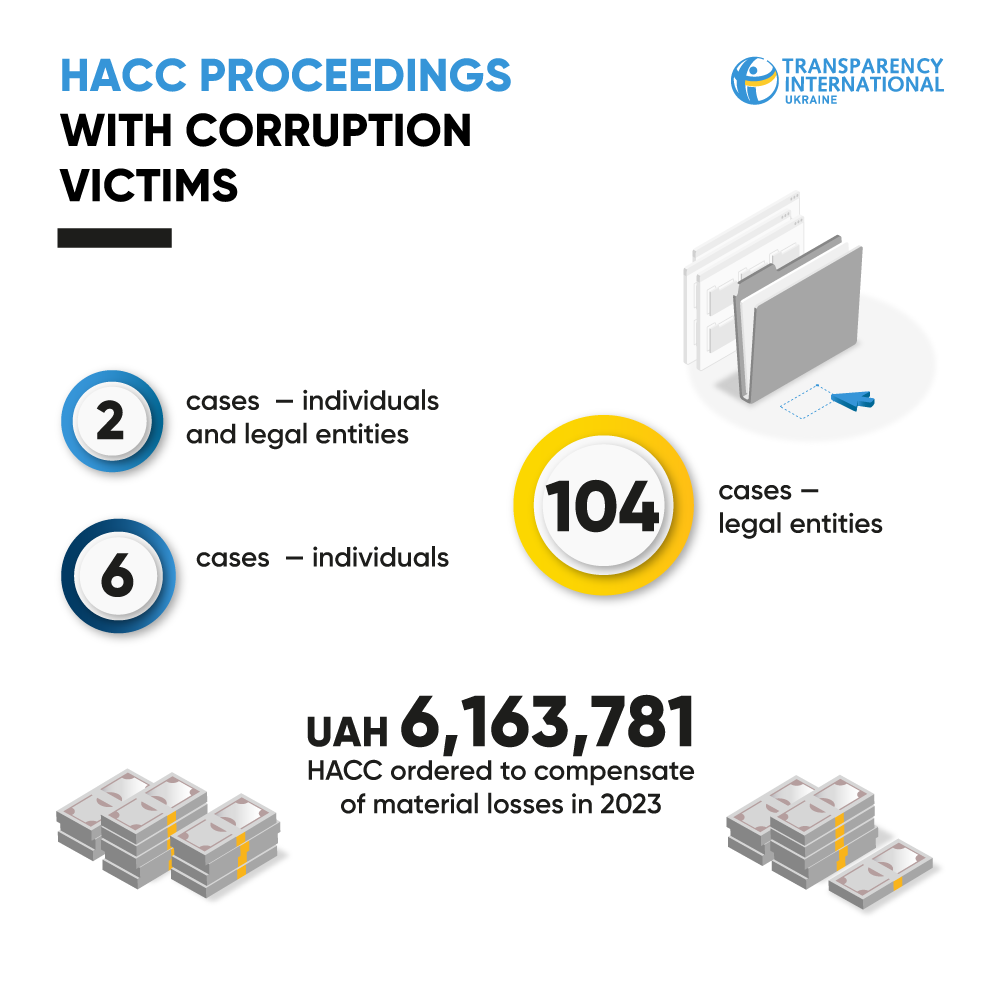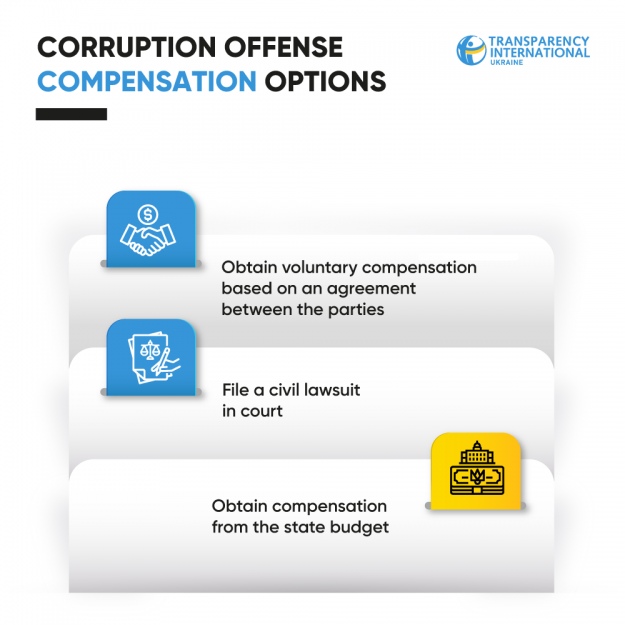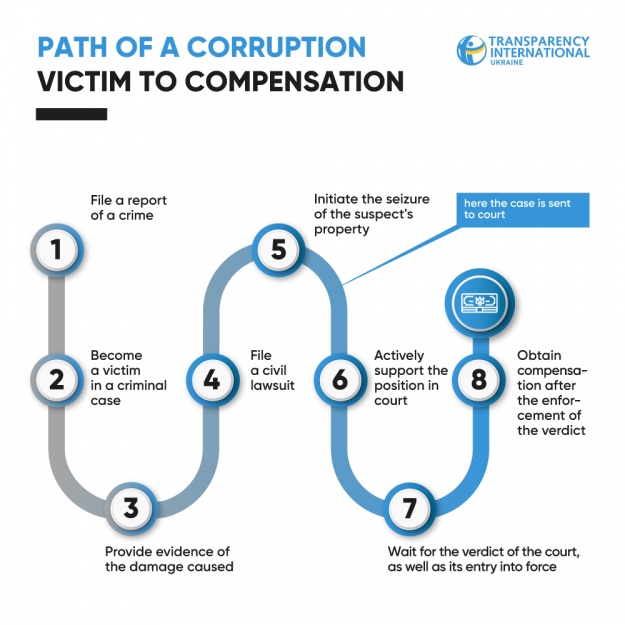Corruption Damage. What Is It and How to Get Compensation?
When talking or writing about corruption, the names of officials accused or already convicted of certain official abuses or bribes often come to mind. But we forget about the other side--people who are demanded money, or enterprises (both public and private), which suffer multimillion losses due to embezzlement. These participants can expect to be compensated for the damage.
For the entire period of the HACC's operation until February 8, 2024, we found that 112 criminal proceedings involved victims. Of these, in 104 cases, the victims were legal entities; in 6 cases--individuals, and in 2 cases, both individuals and legal entities were victims. In 2023, the HACC ordered to compensate UAH 6,163,781 in material losses.
Advertisement:
Let's try to figure out whether corruption victims always obtain compensation, and what's so special about these cases.
Is corruption about abstract or specific damage?
Damage always entails certain losses, omissions, or deficiencies caused to people or an enterprise.
Their size is determined depending on the type of damage. Corruption and related illicit financial flows divert state revenues and cause damage to the national budget, which is to provide health care, housing, education, and other basic services. In addition, corruption undermines the ability of states to ensure respect for human rights.
This is reflected in the work of international institutions. For example, the UN Human Rights Committee in 2018, in its opinion on Bulgaria, mentioned the problem of impunity, which is associated with corruption of high-ranking officials. In addition, corruption undermines the credibility of relevant bodies and contributes significantly to instability--this was emphasized by the United Nations Special Rapporteur on Minority Issues.
However, when committing corruption offenses, one can also talk about specific damage -- moral, material, and physical. For example, moral damage may entail worries, strong emotional reactions, and even mental disorders. It is quite difficult to prove the infliction of this damage, and even more so to measure it.
Mostly, this takes into account the nature and amount of suffering (physical, psychological, mental, etc.) suffered by the plaintiff, as well as the nature of non-property losses (their duration, recovery opportunities, etc.). For example, in one case, a former head of a village council in Kyiv Oblast and an ex-MP were accused of extorting EUR 300,000 and receiving a bribe of USD 10,000 from local entrepreneurs for a long-term land lease. The victims justified the damage caused to them as psychological suffering and humiliation of the honor, and dignity and business reputation of their enterprise, but the court found this damage unconfirmed and paid only material damage.
But there are also opposite examples when the court confirmed the fact of causing moral damage. An ex-MP of the Khmelnytskyi Regional Council was convicted for inciting the acting director of the Kamianets-Podilskyi boarding school Slavutynka to transfer a bribe of USD 50,000 to preserve his position. Then the victim explained that moral damage was manifested in "daily thoughts and memories of those events, feelings of fear, negative experiences, alertness, anxiety, emotional and bodily reactions, sleep disturbances, nervousness, experiencing psychological discomfort, fears about the future... her life plans were undermined, the possibility of building and implementing new prospects and work-related achievements, productive self-realization worsened, her health and therefore the quality of life as a whole deteriorated."
The court found these arguments substantiated and ordered to compensate her with UAH 50,000 in moral damages. Material damage entails monetary or property damage suffered by a person. In this case, it is quite easy to prove the damage and determine its monetary equivalent. For example, it may be money embezzled or misappropriated by a convicted person.
For instance, Andrii Rachkov, the former deputy general director of the Titanium Institute, was accused of embezzling UAH 10 million. He transferred it to the accounts of an offshore company for services that had not been actually provided and performed. PJSC Titanium Institute filed a civil lawsuit in court and obtained full compensation for the damage caused based on the guilty verdict against Rachkov.
It was similar to the case in which the ex-director of the Chornobyl Special Combine was accused of concluding contracts and purchasing diesel fuel and A-92 gasoline at inflated prices. The enterprise suffered UAH 1 million in losses, which were fully compensated under the civil lawsuit. What about the physical damage caused by corruption?
In the four years of the HACC's operation, there have been no such cases in the court's decisions, but corruption can cause physical harm indirectly:
- corruption in the health care sector can lead to death, in particular due to the difference in the quality of services;
- corruption in the construction sector can lead to injuries because there was no proper scaffolding, or the work was of poor quality.
Who are the victims, and what are their rights?
If you have been caused damage by a crime, you can "get" the status of a victim in criminal proceedings by filing a report for a criminal offense. However, not always the victim is the complainant and not every complainant is the victim because anyone can report a crime. Therefore, such a status can be acquired later in the process by submitting an appropriate application for recognition as a victim.
The rights and interests of the victim are protected by law, so they have the right to a representative, can review case materials, submit evidence and testimony, participate in court hearings, express their opinion on the imposition of punishment, conclude reconciliation agreements, appeal court decisions, etc. Most importantly, the victim has the right to compensation.
How can I get compensation for a corruption crime?
There are three options: to obtain compensation voluntarily, to obtain it following a civil lawsuit, or to get compensation from the national budget.

The first option is possible mainly when approving agreements. Often, in such cases, a civil lawsuit is not even filed.
For example, in one of the cases, Ukrzaliznytsia suffered UAH 200 million in losses. The parties reached an agreement on the voluntary reimbursement of UAH 2 million to the company. Such a significant difference in the amounts is due to the property status of the accused, who was supposed to pay the money.
A similar situation occurred when the State Enterprise Derzhinformyust was compensated only UAH 500,000 out of UAH 6.7 million of damage. Defendants who agree to a voluntary payment of compensation may use such leniency to mitigate their punishment. The most common way to get reimbursed is to file a civil lawsuit. This is a statement in which the victim justifies the amount of damage, the fact of its infliction by the accused and asks to reimburse it.
The lawsuit can be filed before the start of the trial. The civil plaintiff can be both the victim and the state--either represented by the SAPO prosecutor (in cases specified by law), or by a separate institution. As of February 8, the HACC completed the consideration of 34 lawsuits in criminal proceedings.
Of these, 18 civil lawsuits were granted (including in part), and only one was dismissed due to unproven damages. There were four cases when the court closed the consideration of civil lawsuits because the plaintiffs renounced them. Another 11 civil lawsuits were left without consideration (quite often because of the acquittal of the accused).
The fate of a civil lawsuit depends on whether the court will convict the accused or acquit them. There were also cases when the civil lawsuit was left without consideration since the statute of limitations had expired in the case against the accused. For example, in the case of causing UAH 13 million of damage to the Department of Health Care of the Zaporizhzhia Regional State Administration, the HACC indicated that it was impossible to establish the circumstances of the offense because the accused was exempted from criminal liability, which is why the civil lawsuit was not subject to resolution, and it was left without consideration.
If the court left the civil lawsuit without consideration, or a person did not file it before the beginning of the consideration, this can be done separately, in civil proceedings. However, we did not find such cases in the practice of the HACC. Sometimes the plaintiffs renounce their civil lawsuit for some reason.
For example, in the case of the criminal organization of Yanukovych-Kurchenko and the seizure of the stabilization loan of the NBU, the victim--National Bank--subsequently renounced the lawsuit, although it had suffered losses of more than UAH 700 million. Therefore, the HACC was forced to leave this claim without consideration. There is also a hypothetical possibility of receiving compensation from the national budget.
After all, the state is obliged to compensate for damage caused by injury, other damage to health, or death (Article 1207 of the Civil Code of Ukraine). Such compensation is awarded when it is unknown who committed the crime or if this person is insolvent.

Unfortunately, a special law that would establish the procedure for such reimbursements has not yet been adopted. As there is no law that would determine the procedure for implementing the state's obligation to compensate for damage to individuals, which is mentioned in Art.
1177 of the Civil Code of Ukraine. Therefore, there have been no such cases within the NABU jurisdiction.
How to improve the situation of corruption victims?
The practice of compensation for corruption crimes is not as large-scale as we would like. Therefore, it is necessary to solve the main problems that exist at the level of legislation and practice of its application.
We have analyzed the reports and publications of the UNCAC Coalition's Victims of Corruption aimed at improving the legal situation of victims of corruption and found such opportunities. First of all, the rules on compensation should be simple, transparent, and clear in application. Victims should be fully informed about the right to claim compensation. Law enforcement agencies and the anti-corruption court should make every effort to ensure and facilitate the participation of victims at all stages of the proceedings, taking into account their position in the consideration of the case.
Certain responsibilities may be entrusted to the state. Proceedings should not cause a financial burden on victims that would prevent or demotivate them from claiming compensation. Therefore, the state should provide assistance and support should victims require them. It is also proposed to consider the possibility of creating special funds and mechanisms from which victims can receive compensation in advance, without waiting for the completion of lengthy civil or criminal proceedings.
This is not always possible, given the requirements of national legislation. Therefore, if compensation can be obtained only after a trial, and there are no proceedings or its consideration is delayed, then the state does not fulfill its obligations. Non-governmental organizations can play an important role in protecting the rights of victims of corruption.
Fabiano Angelico, a representative of Transparency International Brazil, during a speech at the 10th resumed session of the Implementation Review Group for the UN Convention against Corruption (UNCAC), spoke about a case where a company pledged to pay USD 700 million in compensation over 25 years. Prosecutors then agreed that TI Brazil would offer a management system for the fund formed from that company's payments. The fund would be managed by both the company itself and members of the public, and its goal would be to prevent corruption.
In the EU countries, the draft Anti-Corruption Directive is now widely discussed. Our colleagues from Transparency International have provided their opinion on this draft and offer sound recommendations regarding the status of victims of corruption:
- promptly identify and engage victims (state and non-state) in criminal proceedings;
- provide an opportunity to non-governmental organizations to represent the interests of victims;
- organize the activities of coordinators of work with victims;
- ensure in cases against corruption the recognition by victims and the application of the provisions of the EU Directive, which sets minimum standards for the rights, support, and protection of crime victims.
The European Commission in its report on Ukraine also mentioned the need to bring the legislation of Ukraine on the rights of victims in line with Directive 2012/29/EU and Directive 2004/80/EU on compensation to crime victims.
***
As we can see, respecting the rights of victims and providing them with opportunities to protect these rights can reduce the level of corruption in the country. After all, victims, having a private interest, can protect their rights more actively than public authorities and enterprises.
To make this happen, it is necessary to raise people's awareness about obtaining compensation for corruption crimes, to form a clear judicial practice on how to determine the amount of moral damage. Equally important is the quality of legal assistance to victims--in the case of damage caused to enterprises, it is about the effective work of their legal services. This, as well as quality interaction of pre-trial investigation bodies with victims (or potential victims) of corruption criminal offenses, will allow for the establishment of a consistent judicial practice on compensation for damage to victims.
Of course, new practices to protect the interests of victims of corruption should be constantly explored, for example, establishing special compensation funds. However, eventually, Ukraine will need to adopt special legislation on state compensation for losses to victims in cases where an offender has not been identified. The material was prepared jointly with Yulia Poltorak, a lawyer for monitoring HACC cases at Transparency International Ukraine
Disclaimer: Articles reflect their author's point of view and do not claim to be objective or to explore every aspect of the issues they discuss.The Ukrainska Pravda editorial board does not bear any responsibility for the accuracy of the information provided, or its interpretation, and acts solely as a publisher.
The point of view of the Ukrainska Pravda editorial board may not coincide with the point of view of the article's author.